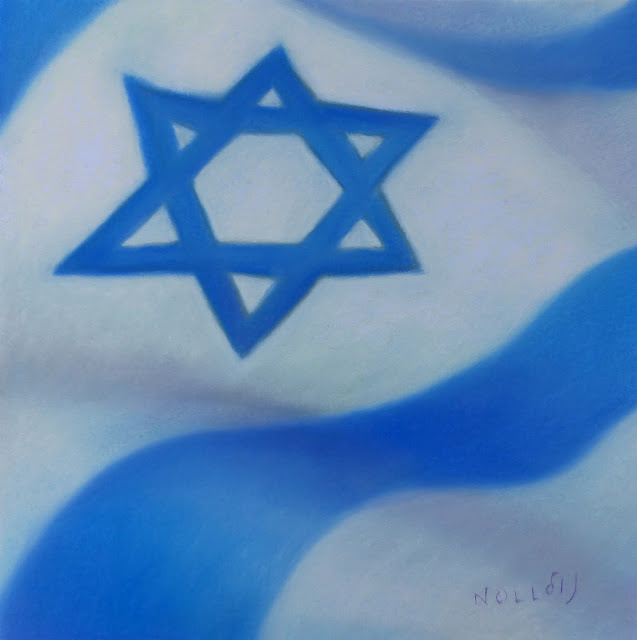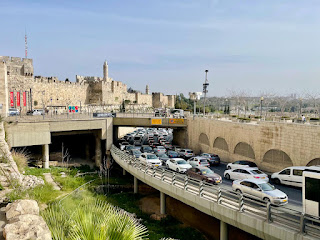A Day in My Life
On Shabbat I went to shul. It had been a long time since I
had gotten up the nerve to enter, since I hadn’t been there in a long, long
time. My friends were all there, as I remembered from before. I pretended to
pray, whatever that means, partook in kiddush... Then I spied an old friend sitting alone on a bench across the bima from where I had
gathered next to the whiskey. He was smiling, as was proper for such a lustrous
character. He walks with a walker, now, but doesn’t do it the way you’d expect.
He pushes it out in front of him as he goes, then shuffles to catch up. He
likes the handles high, like a drag-bike, and enjoys just watching it roll, as
did I witnessing him with it. I sat next to him on the uncomfortably sublime
bench in shul, and we talked of our lives. I saw his Brooklyn soul shining
through tearing eyes as he spoke. Kiddush is like that, telling tales of old
and of new, shiny stories and dull history colliding to recollect truth from
each and every moment.
Many years before, sitting at my own
father’s bedside, I beckoned to my dad to come back from the semi-comatose existence
he had been dwelling within, just for a moment. The time before that was many years before that,
visiting my grandmother in the hospital. We spoke of vacuum cleaner tubes, toy
trains, and learning to skateboard with metal wheels on the sidewalks of Leisure
World, where she had lived as I grew up. The elderly impart tremendous wisdom,
especially as they traverse the borders surrounding the next world. I’m
thinking about this now because many of my friend’s parents have begun to take that journey. I had two shiva calls last week, one of which I
knew the deceased, zikhron lebrakha, and had interacted with him on occasion. The last time I saw
him I was too busy teaching his granddaughter to interact much, which probably helped me to
approach my old friend in shul the way I did. My emotional foster-parent passed
suddenly as well, zikhron lebrakha, well over a year ago. I spoke with him right before his last surgery, his last day,
and I fully expected him to smile up at me, after, but it wasn’t so. My actual
parents have both left the here and now, but I know that they’re all still hovering around here in some way. There are many ways
to tell, but the most prominent of these ways to know informs me daily of such, having sat upon
my dad’s bedside that day, right before he went away.
My father was a strong, tall man that had shriveled to skin
and bones curled fetally upon his bed. It took a year to finally end in the man seen
before me, having traveled from afar time after time. He had a hospice-helper,
my mother, and my brother from the next town over, helping to move his
substantial form hither and thither, from bed to shower to chair. Strokes persisted
to infect my dad’s smile, the right side bright while the left drooped into the
soil; the very soil he adored during life, being a landscape architect and
gardener galore. On another visit from afar my dad told me about the shadows that played
across his window seen from his bed. An ancient eucalyptus tree waved to and
fro in the winds, planted on the corner of his home’s lot, next to the street I
grew up on. He told me how he would wake at night and stare at the movement, the light behind the shadows from a streetlight, the moon, or possibly just shadows bursting forth from themselves. That was a different sort of visit, and towards the end; he was dwelling in
another world and unable to brag about his son, even then. My father’s mother-in-law, my grandmother,
in her hospital bed, always pulled me close when I visited, waving to those nearby and calling
out to them with pride. My father was just so busy, as I still remember him growing
up, with another world altogether.
I didn’t get a chance to talk with him, the grandfather of
my student, the last time I spoke with him. He smiled at me and laughed, seemingly knowing deeply who I was inside and out. It was a month before he passed, zihron lebrakha, and he had a look in his eyes; and in that tiny moment we both seemed to sense something about the line surrounding us all, and how it’s
only really perception in the end. The other side is open and known. The other
side is home away from home, and is far closer to spaces of love than to those of decay.
My grandmother died of emphysema, zikhron lebrakha, but not before I had a chance to crack
perception’s door a bit. I spent an hour a day, every-other day, talking with
her at her bedside. Her eyes lit up when she saw me enter the hospital room,
and then the bragging would begin. She was my mother’s mother, so flippant was a regular on the menu. My mother was diagnosed with DID as a younger woman; hence,
personality was only the nearest thing to now that could be seen. The story of my mother's demise is long and sad, and I’m distraught daily not having had the chance
to be with her in the end, other than a phone call in a shell. Long story
short, her world grew large unnaturally, desire begging creation, and all the
while a dark bubble in her uterus grew. She passed her wisdom from afar, zikhron lebrakha, not knowing her spawn,
not seeing the future ... and I’m only left with a sad and sorry epilogue and few
words of growth on it to spin.
However gruesome, my father’s death defined the majesty of
beauty and of grace, mapping out throughout my life the steps needed to see the
whole, the chase into space from a cocoon in transition. I sat on the edge of
his bed, his blue eyes rolled back to be replaced by the whites, and I spoke of our children, large and
small. He was incapable of response, so monologue became communication in a
world with only ears to hear. A question was incapable, so I asked. My father
stirred, the sheet covering his limp form fluttering slightly. His open jaw
grumbled shut as he slid his elbows to sit. It had been a month since I’d seen
him, so I stayed put on the edge of his bed as tremors erupted from another
world. I had asked my father if he would be there for me when I crossed over. And, with
one foot in this world and one in the next, my father summoned his being to
answer me. He scooted his elbows under him and sat up, his eyes slowly dropping down from the
dimension he had been staring into, then focusing on me piercingly, and with quivering lips said, “Absolutely.” Then my father eased back down into his own
past … and into the future so near. It was the last word that my father ever said to me. He died soon thereafter, zikhron lebrakha, after I had flown home away from home. The boundaries of my world view had shifted to encompass the next. My father had shared with me knowledge unknown. Through the revelation it took many
years for me to feel the obvious, the loss, even though I truly felt it daily. I’m not really sure why; maybe absence grows over time; yes, could be. Walking home from shul with my old friend shuffling to catch up to his walker rolling down the street in front of him, the last thing
I said to him was, “See you next week.”
Shavua tov!















